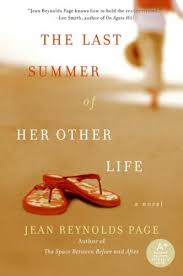
There is something magical about discovering a new author. Wandering into a room, finding a book you long ago purchased sitting on a bookshelf full of old reads and starting anew. For that is what I do with each new book, I start anew, I dive in, I feel a sense of discovery, of excitement of surprise lurking at every turn. I can't explain why I am a compulsive reader. So much of my life has been spent with my nose in a book, my mind working, my eyes lingering on turns of phrases, artful sentences, passages that emit emotion. On a reader's high at the moment, I feel sorry for those who don't read. A woman at line in BandN said: "It really is a shame that I don't read more. I just never have the time." "I page through magazines," she explained, offering up an excuse, feeling embarrassed. I told her: "that counts too," but a minute later I was decrying modern magazines, fed up with the endless wasted words detailing the lives of Jon and Kate, the Octomom, Angelina Jolie. It's all so unimportant. It doesn't count. Reading is magic. I think that is why I loved teaching middle school English. It allowed me the opportunity to dispel small doses of the magic. I got to regal a classroom with a magical passage. I got to introduce reluctant readers to a book that helped them fall down the well, into the world of a reader. My students knew I would buy them books. My mother never denied me books as a child; I couldn't deny them either.
And there is even more magic in the world, as discovering an old book written by a prolific author allows one to reach out and surround themselves with a full tome. I was ecstatic to discover Bread Alone had a sequel. I longed to know more about Wynter.
Defying the law of sequels, I think I liked The Baker's Apprentice even more than Bread Alone. I suppose it is futile to compare them, for it is the backstory of Bread Alone that supports The Baker's Apprentice, letting it stand supported as a rich story. Tabling all of that, the continuation of Wynter's story expanded to include so many surprises. The cast of characters was expanded and I found myself connected to a whole slew of characters. I loved the community and family that was formed at The Queen Anne's Bakery. I loved watching Wynter mentor her apprentice, Tyler, a young woman with blue hair screaming for help and guidance. I loved being provided with glimpses of Mac's perspective as well as viewing the letters he penned Wynter. I whole-heartedly feel that this sequel was a necessity: the story just got so much richer and fuller and more layered. In many ways the book ends with out a complete ending. But it felt right for things to be left the way they did. I loved the final scene, even as a part of me mourned the fact that there were no more pages to continue to regal me.
One of the factors that added to my love of this story was the setting and time period. I have always been rather intrigued by the Pacific Northwest and Seattle in particular. I can imagine myself in such a location. Beyond that, I love that this story takes place in the late 80s and early 90s. It is a world where mix tapes still reigned supreme, where the internet and the tabloids were less omni present, and local cafes weren't places filled to the brim with lit up computer screens. Individuals sat in bars reading, as they sipped their wine. It's a world I would have loved to inhabit. It is also a world populated by people who came of age in the 70s. I find those individuals fascinating.
I entered pure flow when reading this book. I was basically unaware of my surroundings (oh the life of a student on summer break, done with work!) - and just sat reading for hours on end, something I do way too often, but something I can't stop.
Futzing around on the internet, I have learned Hendricks plans to write a third story about Wynter. I know I will continue to love learning about the lives of CM, Mac, Tyler, Ellen, and the rest of Wynter's cast of characters. I am also deeply excited to read the rest of Hendrick's books.







